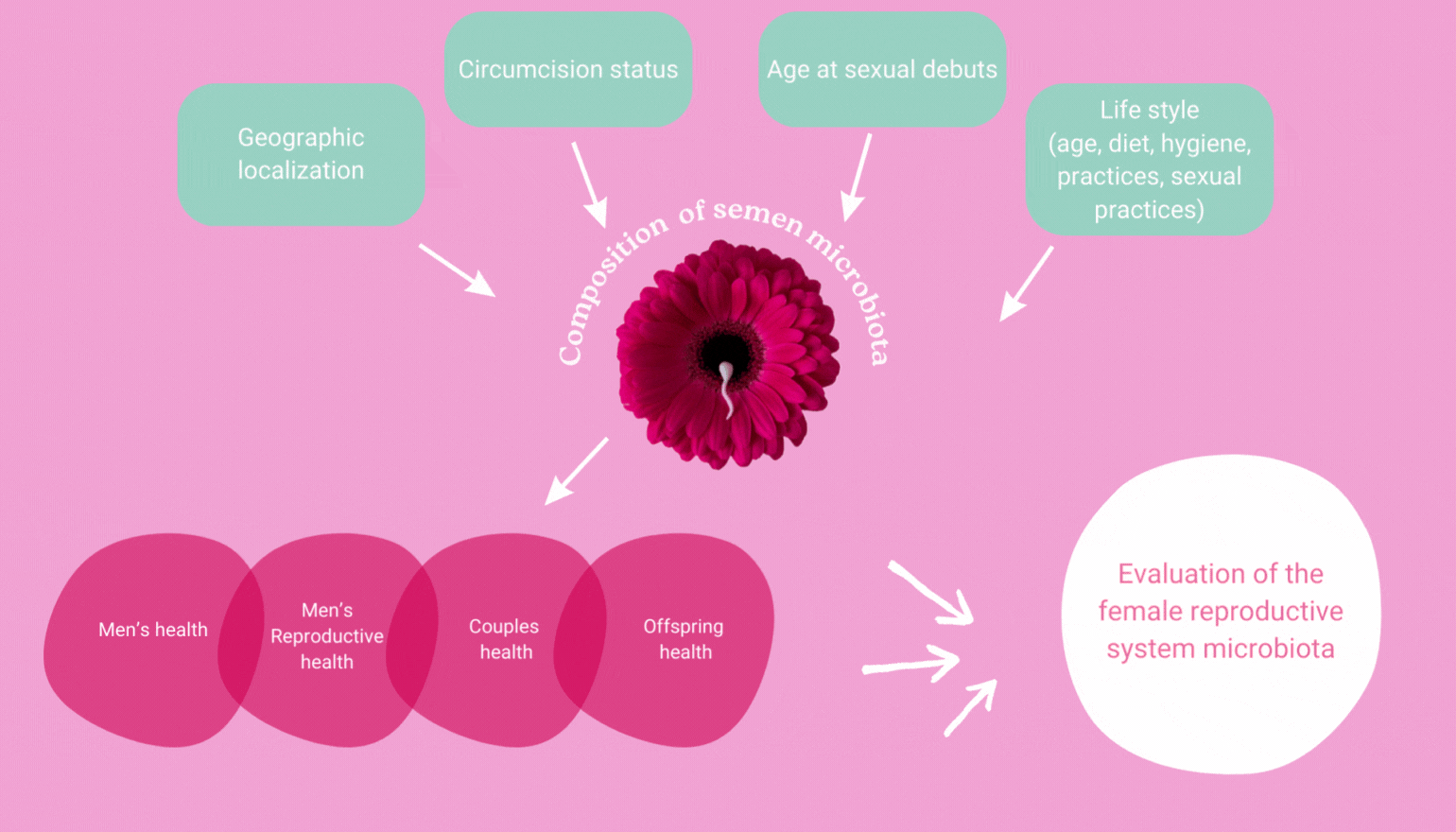
FERTILITY IS A TEAM SPORT: MALE MICROBIOME & INFECTION TESTING
It's widely acknowledged that successful infertility treatment requires investigating both partners, as infertility typically results from a combination of male and female factors. This principle extends to the genital tract microbiome. Unprotected sexual intercourse facilitates the exchange of microbes, with evidence suggesting that bacteria can be shared between partners. Additionally, each partner appears to influence the microbiome composition of the other, with factors like age at sexual debut, contraceptive use, and sexual activity frequency playing significant roles.
The FERTILYSIS Male Microbiome tests for bacterial infections, yeast, STDs, and viruses in a self-collected, mail-ordered semen sample. Compared to conventional testing, the FERTILYSIS Male Microbiome panel is a more sensitive and quantitative method of molecular analysis that provides a detailed analysis of the seminal microbiome, allowing new potential targets for therapeutic intervention and personalized treatment.
FERTILYSIS Male Microbiome
490€

Self-collectable, non-invasive & painless sampling method

No doctor's referral

Semen

Storage in the freezer. Shipping at ambient temperature

Results in 10 business days
Time matters! FastTrack Results.

Your time matters because your journey should always be a priority, every step of the way.
Fertilysis FastTrack Results stand as a commitment to remove barriers and redefine timelines. Get your test results in 5 working days expedited, from the day your sample reaches us, instead of the standard processing time.
290€
WE GOT YOU.
Disruption of the normal seminal Microbiome can have a detrimental effect on sperm quality. Presence of bacteria in sperm and the recruitment of seminal leukocytes can potentially impair male fertility through the deterioration of spermatogenesis, impairment of sperm function, and genital tract dysfunction and/or obstruction.
Bacterial infections of the male accessory sex glands correlate with the decline of semen analysis parameters such as count, motility and morphology, as well as sperm DNA damage through inflammation, reactive oxygen species (ROS) more commonly known as oxidative stress.
It's noteworthy that the harmful impact may not solely be due to inflammatory cytokines or increased production of reactive oxygen species. Microbes can also directly interact with sperm cells, either by adhering to them or by releasing substances that affect sperm motility or induce apoptosis. Furthermore, bacterial infections from the male partner can endanger the microbiome of the female partner and her reproductive health. Recent studies have shown that the seminal microbiota may not only play a role in the regulation of men’s reproductive health, but may also affect the health of the couples and that of their offspring through the transfer of microorganisms. Semen has been identified as a medium for the transmission of bacteria and viruses between men and women, contributing to the development of sexually transmitted diseases, while bacteria, yeast, viruses, and parasites, are known to in interfere with reproductive functions in both sexes.
Prostatitis, Microbiome, Infertility and your Health
World health organization (WHO) studies indicate prostatitis accounting for 12% of male infertility cases, ranking third among causes. Prostatitis-related inflammation can obstruct the male genital tract and impair spermatogenesis. High-grade oxidative stress (OxS) in prostatitis alters sperm metabolism, motility, and DNA integrity. The distinction between benign prostatic hyperplasia (BPH) and prostatitis is unclear, with some viewing them as the same condition. Microorganisms are detected in 21–44% of BPH patients' prostate tissue, with inflammation evident in 90–100% while E. coli endotoxin may stimulate prostate growth. In addition to reproductive health problems, local Oxs in prostatitis correlates with systemic OxS, detectable in blood and urine linked to various diseases, including cancer and cardiovascular issues, potentially explaining the higher prevalence of cardiovascular diseases in BPH patients. In fact, prostatitis onset at a younger age significantly impacts BPH and is a key risk factor for prostate cancer.

Consider Male microbiome testing:
When you and your partner have been diagnosed with “unexplained infertility”
When you have abnormal sperm (bad or borderline semen analysis results)
When you have a high DFI (DNA Fragmentation Index)
When your partner has detected infections in her Microbiome
When you have a history of Prostatitis
The Fertilysis Microbiome test aims to thoroughly analyze the male reproductive tract microbiome, identify any imbalances or dysbiosis, and intervene therapeutically. This involves using antibiotics to eliminate pathogenic infections as well as, using male supplementation to restore normal flora and promote seminal health and fertility.
If you have a Fertility Specialist:
If you don’t have a Fertility Specialist:
Probiotic & Prebiotic supplementation:
FERTILYSIS Male Microbiome
FERTILYSIS Couples Microbiome
HOW IT WORKS.

Place your order online and get the FERTILYSIS box delivered at your home.

Follow our instructions to collect your samples and ship them back to us for analysis.

Receive your easy to understand results including treatment suggestions in just a few days via email.
Is your infertility really ‘’unexplained’’ or are you still undiagnosed?If you have been struggling with infertility and haven’t been getting convincing answers, chances are you are still missing a piece of the puzzle.
Did you receive treatment? Retest to confirm.
Retesting is essential for evaluating the effectiveness of your treatment and making necessary adjustments. It allows us to determine if the treatment was effective or needs to be repeated, preventing recurring infections. Through careful reevaluation, we ensure that your personalized treatment plan remains effective. Additionally, it helps to identify any microbiome imbalances that may have arisen post-treatment. We offer the retesting at a discounted price to support your continued care and make the follow-up process more accessible. Consequently, it is recommended that the retesting occurs no later than 1 – 2 months following completion of treatment, and, in any case, it should take place no longer than 6 months from the initial test.

240€
Male Microbiome Retest
STILL HAVE QUESTIONS?

These our the most common questions regarding this panel.
If you have more, please refer to our Q&A page.
The The FERTILYSIS Male Microbiome tests can detect more than 35 pathogens (STIs, yeast & normal microflora) and includes an extended virus panel detecting CMV, EBV, HSV-1, HSV-2, and HHV-6 in a self-collected, mail-ordered semen sample. Compared to conventional testing, the FERTILYSIS Male Microbiome panel is a more sensitive and quantitative method of molecular analysis that provides a detailed analysis of the seminal microbiota, allowing new potential targets for therapeutic intervention and personalized treatment.
Absolutely! Our specially developed preservative ensures that Fertilysis DFI test is possible through mail order from the comfort of your home without the discomfort associated with semen sample collection in a medical facility or waiting lists. We ship worldwide!
While male microbiome testing, unlike semen analysis, does not require any duration of sexual abstinence, we advocate a recommended period of at least 1-2 days of abstinence from unprotected sexual activity. This precautionary measure aims to mitigate the potential for false positive results arising from the transfer of bacteria and microflora from the female partner during sexual intercourse. Adhering to this guideline ensures a more accurate representation of the male microbiome, contributing to the reliability and precision of the testing outcomes.
Semen Sample for Male Microbiome testing should be stored in the freezer.


